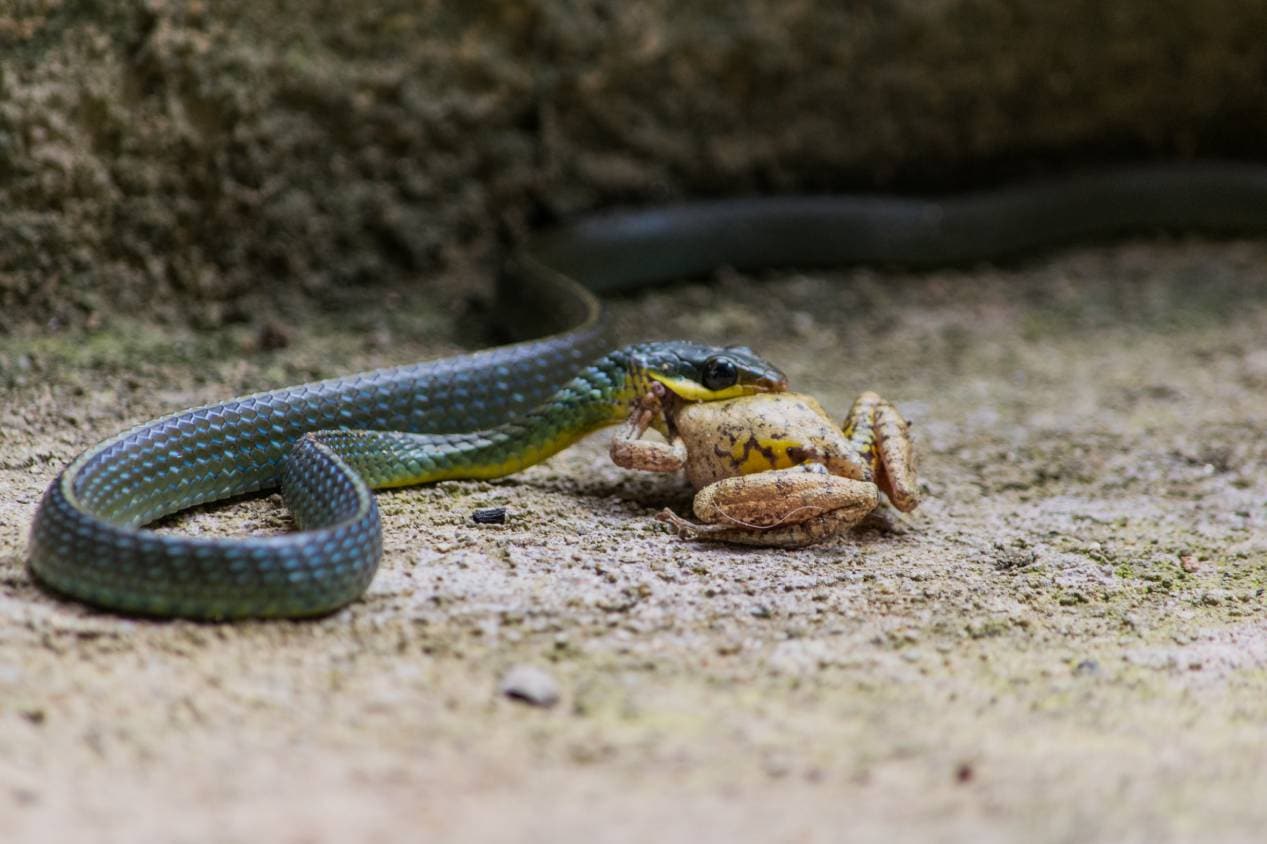VET APPROVED

The information is current and up-to-date in accordance with the latest veterinarian research.
Learn more »Snakes are described as cool, creepy, and hardy animals that can make great pets, depending on the type of snake (and of course, the type of owner) in question. One thing snake owners love about their scaly pets is that they don’t have to be fed very often. In fact, some snakes can go weeks, if not months, without eating.
It can be difficult to give a one-size-fits-all answer to how long snakes can go without eating, though. A variety of factors impact a snake’s metabolism, such as the snake type, the snake’s age, and the time of the year. Although these factors can affect the exact length of time, snakes as a whole can go much longer than people without being fed.
To learn more about snake eating habits and how long they can go without food, read on. This article answers all your most pressing questions about snake appetite, diet, and more.

How Long a Snake Can Go Without Eating: A Closer Look
Generally speaking, healthy adult snakes can go a long time without being fed or eating. Nearly all such snakes can last a few weeks, no problem. Similarly, some very well-adapted large snakes can even last a few months. After the two-month mark, these larger snakes will begin to starve.
That being said, some snakes have been known to go months and even years without food. These snakes are typically very large and not kept as pets, though. Instead, they slither in the jungle or make great exhibits at the zoo.
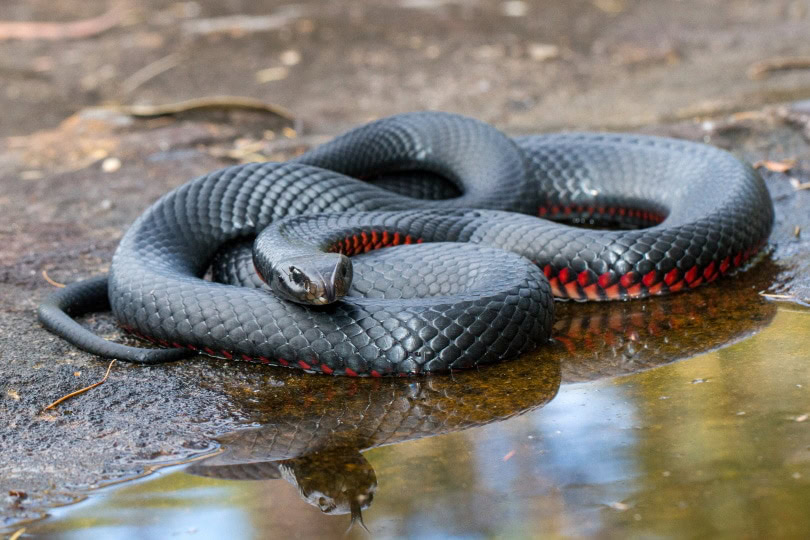
A Word of Caution
It’s important to note that even though snakes can go much longer without eating than humans, they still need a consistent eating schedule. If you go weeks or months in between feeding your snake, they will get sick and develop nutritional deficiencies.
In other words, don’t try to test how long your snake can go without eating. This will only harm the snake. At the same time, you don’t have to worry if you are going out of town for a week. The snake will be fine going a couple of days without food.

Factors That Affect How Long a Snake Can Go Without Eating
In order to understand just how long a snake can go without eating, you will have to understand that different factors affect snakes’ metabolism rates. The most important factors to consider include the snake type, age, and season of the year.
Snake Species
The most obvious factor that affects your snake’s metabolism is its species. Smaller snakes have to eat more frequently since they have a faster metabolism. In contrast, larger snakes can go much longer in between feedings.
Two of the most popular pet snakes are ball pythons (Python regius) and corn snakes (Pantherophis guttatus). As healthy adults, both of these species need to be fed once per week or once per two weeks (after factoring in a few other circumstances).
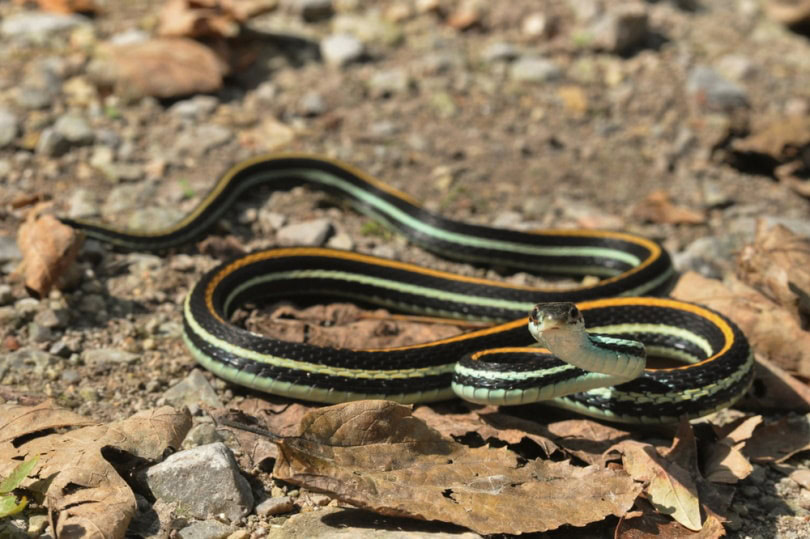
Age
Age is another factor that largely impacts the snake’s metabolism. Younger snakes have to eat much more frequently because they are growing at a rapid pace. Recent hatchlings and juveniles will eat every day to every other day, whereas adults often only have to be fed once a week or less.
Time Of Year
One factor that may shock you is that the season or time of year affects how frequently snakes eat. Certain snakes go through brumation, which is very similar to hibernation. While snakes are brumating, their metabolism slows down, and they stop eating. This is most likely to happen during the winter whenever food sources are scarcer.
Similarly, snakes eat less whenever they are shedding. Snakes don’t typically shed based on a particular season, but they shed on a relatively consistent schedule. Once your snake is getting ready to shed, their appetite will decrease, and they will not eat as frequently.
Why Snakes Can Go Without Food for So Long
Even if these factors impact exactly how long a snake can go without eating, all snakes can go much longer without food than humans. Why is that? The answer is rather simple: the snake’s metabolic rate.
Shockingly, snakes have the ability to lower their own metabolic rates up to 70%. Whenever the metabolic rate drops, fewer calories are used to support the body’s natural processes. Hence, snakes don’t have to eat as frequently because their previous meal lasts longer for energy.
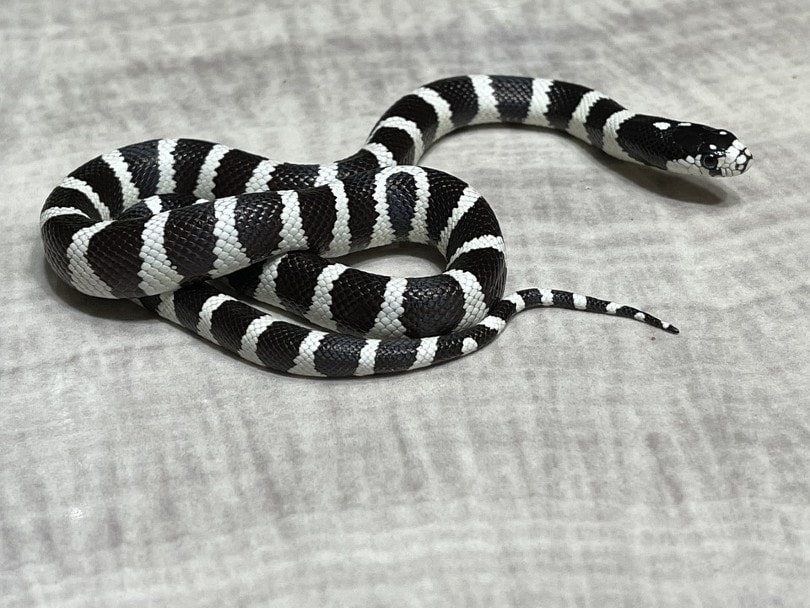
The Starvation Period
More so, snakes can go so long without food because their bodies have evolved in such a way that they undergo unique processes whenever they enter the starvation period. Much like us, snakes will begin to burn their fat stores. This is a common way to survive the beginning of starvation for many animals.
After the snake has used up all of their fat stores, what they will do next depends on their species. Some snakes will actually break down the proteins in their body. The rat snake (Colubrinae) is one family that does this. In contrast, other species will go to extreme adaptations, such as having the ability to digest their hearts for energy or increasing the size of their head so that they have more food options.
Eventually, the snake will die if they do not find a food source. However, this may not happen until the snake has not eaten for one or two years.
FAQs
How often should I feed my snake?
How often you should feed your snake depends on their species. Corn snakes and other smaller varieties need to be fed once every 7 to 14 days. Similarly, the Ball python can be fed once every 7 to 14 days. It’s important to research the correct feeding schedule for your specific type of snake. These guidelines also assume a healthy adult snake; as mentioned above, a juvenile or otherwise unwell snake would have different nutritional requirements (and therefore, a different feeding schedule).
What should I feed my snake?
Snakes are carnivores, which means they eat animal meat exclusively. In the wild, their diet consists of eggs, frogs, rabbits, rodents, and other small animals. As pets, snakes typically eat small mice and rats. It’s especially a great idea to feed your pet snake frozen mice specifically so that they don’t get injured from the mouse fighting back.
Why is my snake not eating?
If your snake is not eating, you do not need to stress immediately. Often, snakes will stop eating whenever they are beginning to brumate or shed. However, you may need to take your snake to the vet if the snake never enters into the brumation or shedding period and continues to reject food.
The most common reason that snakes do not eat is stress. Any form of routine change or stress will cause the snake to not eat temporarily. Of course, the snake will begin eating again once the stressor is removed.
Snakes may not eat if they are sick as well. Issues such as mouth rot, parasites, and nutritional deficiencies may cause your snake to not eat. It’s important to take your snake to an exotic vet if you believe illness is behind your snake’s rejection of food.
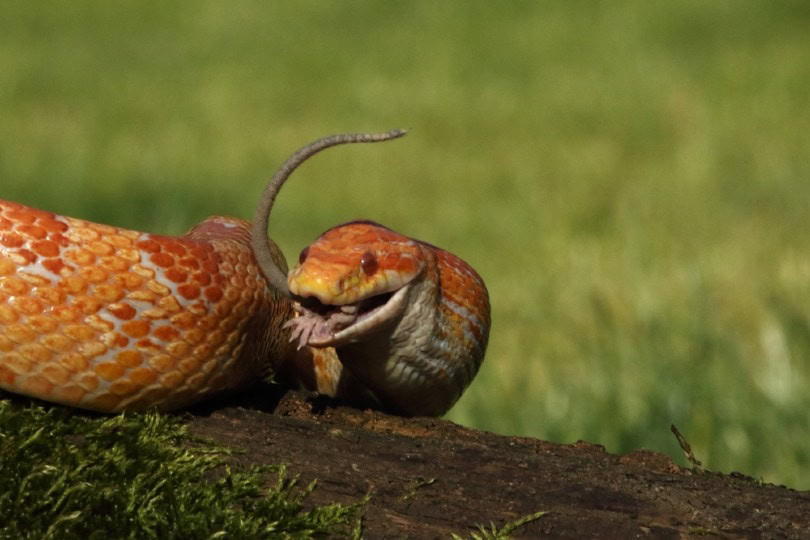
Final Thoughts
Because snakes require less energy than us, they can go much longer without food. Most species can go weeks if not months without food. Some species are even known to go a year or two. That being said, it’s important to feed your snake a consistent and healthy diet. Even though snakes can go a long time without food, it does not mean it is healthy for them.
Featured Image Credit: Mari Nuffer, Shutterstock
